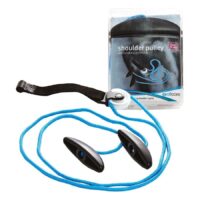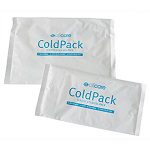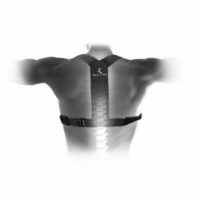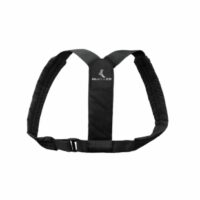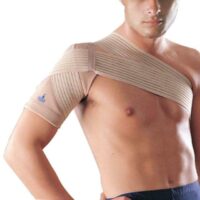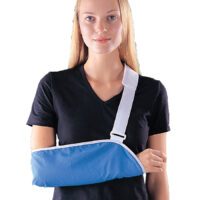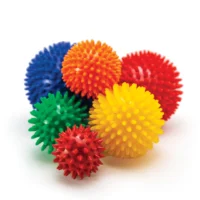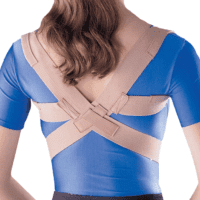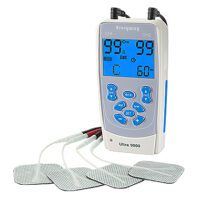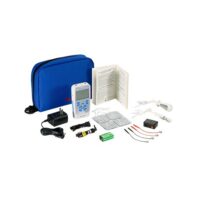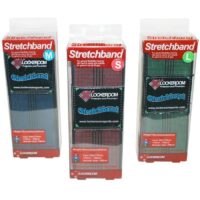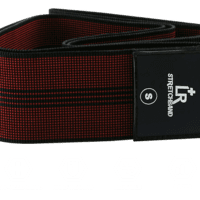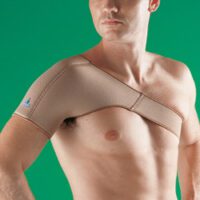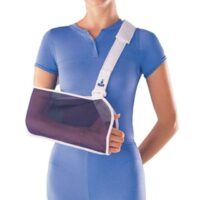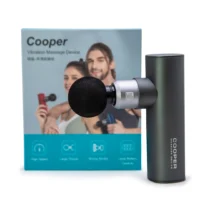Shoulder Arthritis

Article by Harry Lawrence

Shoulder Arthritis
Shoulder arthritis, also known as osteoarthritis, frequently leads to pain as you get older due to daily wear and tear on your joints. Overworking or injuring your shoulder heightens your risk of developing arthritic changes, although most commonly, age-related changes in joint tissues cause arthritis.
Typically, arthritis affects your glenohumeral or acromioclavicular (AC) joints. However, it can also present as rheumatoid arthritis, rotator cuff arthropathy, post-traumatic arthritis, or avascular necrosis.
Identifying Symptoms of Shoulder Arthritis
Shoulder arthritis may result in:
- Pain
- Stiffness
- Weakness
- Sensations of clicking, popping, or grinding
- Swelling and inflammation
These symptoms can severely affect your daily activities, particularly those involving lifting your arms overhead or moving them behind your back.
Diagnosing Shoulder Arthritis
To diagnose shoulder arthritis, healthcare practitioners use a mix of physical evaluations and medical imaging. If you’re experiencing persistent shoulder pain or related symptoms, your physiotherapist or doctor will delve into your medical history and assess your shoulder’s range of motion, strength, and any signs of swelling or tenderness.
X-rays are a common tool to confirm arthritic changes and its severity. Sometimes, more in-depth imaging such as MRIs, ultrasound scans, or CT scans are necessary for a comprehensive understanding of the condition. Getting a professional evaluation for an accurate diagnosis and treatment approach is essential.
Managing Shoulder Arthritis
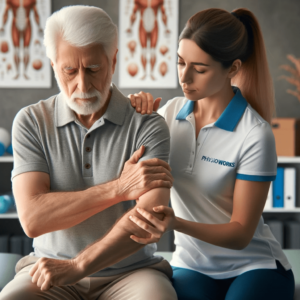
Various methods are employed to treat shoulder arthritis:
Exercise: Targeted exercises are the best method to manage pain, strengthen muscles, and increase joint flexibility. It’s important to begin slowly under the guidance of a physiotherapist.
Medication: Painkillers, NSAIDs, corticosteroids, DMARDs, or biologicals may be prescribed to reduce pain and inflammation and to decelerate the disease’s progression.
Injections: Corticosteroid or hyaluronic acid injections provided by healthcare professionals can offer temporary relief from pain and inflammation in the shoulder joint.
Surgery: The necessity for surgery depends on the severity of your symptoms. Options include arthroscopy, total shoulder replacement, or partial shoulder replacement. Despite their effectiveness in reducing pain and improving function, surgical procedures come with risks such as infection and the potential for ongoing pain.
Rehabilitation After Surgery
Post-operative rehabilitation is crucial for recovery, aiming to restore full shoulder motion, strength, and functionality. Under the supervision of a physiotherapist, this rehabilitation usually spans several months. Wearing a sling may be necessary initially to protect the healing area after surgery.
For personalised advice on post-surgical shoulder rehabilitation, it’s advisable to consult your physiotherapist.
Conclusion
In conclusion, shoulder arthritis is a common condition that can significantly impede daily activities and reduce quality of life. Recognising the symptoms early and seeking prompt medical advice are key to managing the condition effectively. A combination of exercise, medication, injections, and possibly surgery, followed by a comprehensive rehabilitation program, can help manage the symptoms and maintain shoulder function. It’s vital to work closely with healthcare professionals to tailor a treatment and recovery plan that aligns with your individual needs and lifestyle. With the right approach, it is possible to manage your arthritis effectively and enjoy a more active, pain-free life.
More info
Shoulder Pain Causes
Common Injuries & Conditions
Understanding the common shoulder pain causes is crucial, as this discomfort can stem from various issues like rotator cuff injuries, arthritis, and frozen shoulder. Our guide offers a comprehensive exploration of these causes, providing insights into both acute and chronic conditions. It aims to equip you with knowledge and strategies for effective treatment and recovery, catering to those grappling with recent injuries or long-term pain. This resource is your go-to for navigating the complexities of shoulder pain and its management.


Rotator Cuff
- Rotator Cuff Injury: A common condition causing shoulder pain, often due to repetitive overhead activities.
- Rotator Cuff Tendinopathy: Inflammation or damage to the rotator cuff tendons, leading to pain and reduced mobility.
- Rotator Cuff Calcific Tendinopathy: Characterised by calcium deposits in the rotator cuff tendons, causing intense pain.
- Rotator Cuff Tear: Involves a tear in the rotator cuff muscles, often resulting from injury or wear over time.
- Bicep Tendinopathy: Affects the bicep tendon, leading to pain in the front of the shoulder.
Shoulder Impingement Syndrome
- Shoulder Impingement: A condition where shoulder tendons are pinched during arm movements, causing pain and limited mobility.
- Shoulder Bursitis: Inflammation of the bursa, a small fluid-filled sac in the shoulder, causing pain and discomfort.
- Swimmer’s Shoulder: An overuse injury common in swimmers, causing shoulder pain and impingement symptoms.
Shoulder Stiffness
- Adhesive Capsulitis / Frozen Shoulder: A condition where the shoulder becomes stiff and painful, often developing gradually without a specific cause.
Shoulder Instability
- Shoulder Dislocation: Occurs when the shoulder joint is forced out of position, causing pain and instability.
- Functional Shoulder Instability: Chronic instability in the shoulder, often leading to recurrent subluxations, dislocations and pain.
Acromioclavicular Joint
- AC Joint Injury: Involves damage to the acromioclavicular joint, common in athletes and after falls.
Bone Conditions
- Shoulder Arthritis: Degenerative joint disease affecting the shoulder, causing pain and stiffness.
- Broken Shoulder / Fractured Humerus: A break in the shoulder bone, often resulting from trauma or falls.
- Stress Fracture: A small crack in the bone, typically caused by overuse and repetitive activities.
Post-Operative Physiotherapy
Post-Operative Shoulder Rehabilitation: Essential for recovery, involving tailored exercises and therapies to regain strength and mobility after shoulder surgery.
- Subacromial Decompression: A surgical procedure to alleviate shoulder impingement symptoms.
- Shoulder Arthroscopy: Minimally invasive surgery for various shoulder conditions.
- Acromioplasty: Surgery to reshape the acromion and relieve impingement.
- Rotator Cuff Repair: Surgical repair of a torn rotator cuff.
- SLAP Repair: Surgery to fix a specific type of labrum tear in the shoulder.
- Biceps Tenodesis: Surgical procedure to reattach the biceps tendon.
- Biceps Tenotomy: Involves cutting the biceps tendon to relieve pain.
- Total Shoulder Replacement: Replacement of the shoulder joint with artificial components.
Muscle Conditions
- Muscle Strain: A tear or stretch in a muscle, often causing pain and limited movement.
- DOMS – Delayed Onset Muscle Soreness: Muscle pain and stiffness that occurs hours after unfamiliar or strenuous exercise.
Neck Arm Syndromes
Referred Pain: Pain in the shoulder that originates from another area of the body, such as the neck or spine.
- Neck Arm Pain: Pain that originates in the neck and travels down to the arm and shoulder.
- Cervical Radiculopathy: Occurs when a nerve in the neck is compressed or irritated, leading to shoulder pain.
- Thoracic Outlet Syndrome: A condition where nerves or blood vessels between the collarbone and first rib are compressed, causing pain in the shoulder area.
Systemic Conditions
- Fibromyalgia: A chronic condition characterised by widespread musculoskeletal pain, including in the shoulder.
- Rheumatoid Arthritis: An autoimmune disorder that can cause joint pain and damage throughout the body, including the shoulders.
Shoulder Products & FAQs
Explore our range of shoulder products and find answers to frequently asked questions about shoulder pain and treatment options.
Shoulder Pain FAQs
Your Comprehensive Guide to Understanding and Managing Shoulder Injuries
Welcome to the "Shoulder Pain FAQs" page, your go-to resource for understanding various aspects of shoulder pain, injuries, and how to manage them effectively. The shoulder is a complex joint that allows for a wide range of movements, but it is also susceptible to various injuries and conditions that can cause discomfort and limitations in daily activities.
In this comprehensive guide, we will explore the most common shoulder injuries, their causes, and how to identify and treat them. We'll also address frequently asked questions about specific shoulder conditions, providing you with valuable insights into your shoulder health.
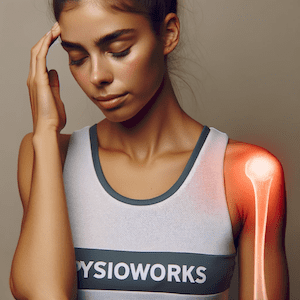

When Should You Worry About Shoulder Pain?
Shoulder pain can be caused by numerous factors, ranging from minor strains to more severe injuries. Knowing when to seek medical attention is crucial to prevent further damage and facilitate timely recovery.
Common Shoulder Injuries
We'll swing into the most prevalent shoulder injuries, shedding light on their causes, symptoms, and appropriate treatment options.
More info: Common Shoulder Injuries
What Causes Shoulder Pain?
Understanding the root causes of shoulder pain is fundamental to addressing the issue effectively. We'll explore the various factors that can lead to shoulder discomfort and how to mitigate them.
More info: What Causes Shoulder Pain?
What is Your Scapulohumeral Rhythm?
The scapulohumeral rhythm plays a vital role in shoulder function and movement. We'll explain what it is and its significance in maintaining a healthy shoulder.
More info: What is Your Scapulohumeral Rhythm?
Rotator Cuff: An In-Depth Analysis
The rotator cuff is a critical group of muscles and tendons in the shoulder. We'll dive into its anatomy, functions, and common problems associated with it.
More info: Rotator Cuff: An In-Depth Analysis
How Can You Tell If You Have Torn Your Rotator Cuff?
Identifying a torn rotator cuff can be challenging, but we'll provide you with essential signs to look out for and when to seek professional evaluation.
More info: How Can You Tell If You Have Torn Your Rotator Cuff?
Can You Diagnose A Torn Rotator Cuff Without An MRI?
Find out about diagnostic methods for a torn rotator cuff, including whether an MRI is always necessary for accurate diagnosis.
More info: Can You Diagnose A Torn Rotator Cuff Without An MRI?
Can You Lift Your Arm With A Rotator Cuff Tear?
Discover the limitations and challenges you may face if you have a torn rotator cuff and how to manage arm movement during the healing process.
More info: Can You Lift Your Arm With A Rotator Cuff Tear?
Will Your Shoulder Blade Hurt With A Torn Rotator Cuff?
Learn about the possible relationship between a torn rotator cuff and shoulder blade pain, and what it indicates about your shoulder health.
More info: Will Your Shoulder Blade Hurt With A Torn Rotator Cuff?
Will A Cortisone Injection Help A Torn Rotator Cuff?
Cortisone injections are sometimes used for shoulder pain, but their effectiveness in treating a torn rotator cuff is a point of interest we'll explore.
More info: Will A Cortisone Injection Help A Torn Rotator Cuff?
How Can You Make Your Rotator Cuff Heal Faster?
We'll provide practical tips and strategies to aid in the healing process of a torn rotator cuff and restore shoulder function more rapidly.
More info: How Can You Make Your Rotator Cuff Heal Faster?
Shoulder Bursitis: Understanding the Condition
What is shoulder bursitis, and how does it differ from other shoulder injuries? Get insights into this inflammatory condition and how to manage it.
More info: Shoulder Bursitis: Understanding the Condition
Shoulder Impingement: Causes and Solutions
Understand the concept of the shoulder impingement zone and the factors contributing to rotator cuff impingement and bursitis.
More info: Shoulder Impingement: Causes and Solutions
Frozen Shoulder: Overcoming the Stiffness
Discover how to unfreeze a frozen shoulder and regain a full range of motion through effective therapeutic approaches.
More info: Frozen Shoulder: Overcoming the Stiffness
Shoulder Dislocation/Instability: Seeking Stability
Explore the causes of shoulder dislocation and instability, and the fastest ways to promote healing and prevent future occurrences.
More info: Shoulder Dislocation/Instability: Seeking Stability
Can You Fix Shoulder Instability?
Find out about treatment options to address shoulder instability and regain stability in the joint.
More info: Can You Fix Shoulder Instability?
AC Joint: Identifying and Managing Injuries
Learn how to recognise an injured AC joint and what steps to take for proper care and recovery.
More info: AC Joint: Identifying and Managing Injuries
Swimmers Shoulder: Causes and Remedies
If you're a swimmer or engage in repetitive overhead activities, understanding the causes of swimmer's shoulder and how to prevent it is essential.
More info: Swimmers Shoulder: Causes and Remedies
We hope this comprehensive guide will prove invaluable in your journey to understand and manage shoulder pain and injuries. However, it's essential to consult a healthcare professional for personalised advice and treatment based on your specific condition. Let's dive into the world of shoulder health together!


















